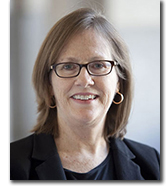
Background
"I got my B.A. at Lancaster University in England in Russian and Politics and my Ph.D. from the London School of Economics. Having learned Russian in high school, I started out as a Russian Language and Literature major but decided to change because I couldn't stand long, boring Russian novels. I was interested in Russian politics, however, because I grew up in the Cold War in Colorado Springs, which became a big military town. The politics in the '60s surrounding the Vietnam War were very interesting, so in England I engaged in many marches against that conflict.
"I usually go to Russia about once a year to do research. It has obviously changed a lot since the fall of the Soviet Union. It was the height of the Cold War, then everything fell apart, and finally Vladimir Putin came into power. I have seen the country go through all these different changes.
"I spent 15 years in England and 15 years in D.C. before coming to Miami. In England, I worked at a tenured academic job, but I was also a Special Adviser to the House of Commons Foreign Affairs Committee. This was when Margaret Thatcher was Prime Minister and when they were investigating what the British response should be to the Soviet invasion of Afghanistan. That was extremely fascinating. When I was in D.C., I did two years in the State Department in Policy Planning when Gorbachev first came to power. I like policy work a lot and I like exposing students to it as well."
Noteworthy Accomplishments
"I have published several books. A book I have been working on for the past five years, Putin's Kleptocracy: Who Owns Russia?, was published in September 2014. [Read more about the book in the February 2015 Miami press release Russian studies expert Karen Dawisha believes President Vladimir Putin using Ukraine.] In the spring of 2014 I was awarded the Harrison Medallion for Distinguished Contributions to Higher Education by Miami, which is great, and it allowed me to meet Forest Whitaker when he came to give Miami's commencement address later that spring."
Teaching
"I've recently begun teaching a class about the end of the Cold War. What is intellectually fascinating about it is that it is one of the most important events of the 20th century, and it occurred almost completely without violence. So how is that? In a century marked by almost nothing but violence, how is it that this arch nemesis completely imploded? I also teach Russian politics in the spring of every year.
"I think students would say that I run a very active class. I believe in games and simulations and mock trials and debates. A scenario might be that it is 1985, Gorbachev has just come to power, and students have to play the parts of other members of the political elite and brief him on what the situation is in Eastern Europe. In other words, they have to do it from the Soviet perspective! In the Russian politics class, we do mock trials—putting Gorbachev, Yeltsin and Putin on trial. Although we put Putin on trial every year, he is never found guilty. I am hoping one year he is. Maybe that's why I had to write this book!"
Research
"Besides my most recent book, I have also written three books on Soviet foreign policy: one toward the Middle East, one toward Eastern Europe, and one about the Soviet invasion of Czechoslovakia. I wrote another book about the collapse of the Soviet Union and the emergence of these 15 new countries. It takes usually five to seven years to write these books, starting with publishing my first book when I was 27, which came out of my dissertation.
"I make sure to involve both graduate and undergraduate students in my research. One summer about four years ago I hired two undergrads to help do basic research on political personalities. One of them is working in the intelligence field now. Three summers ago I worked with Sarah Christin Mueller, a German summer scholar who went to Berlin and worked in the secret police archive, about one of the people who is featured in the Putin book. That was a very successful collaboration!"
Outside the Classroom
"I have barely had any time to myself lately because I have been focusing on my book, but I love exercise. I am in a triathlon group and do a lot of yoga, both of which I enjoy a lot. I also love beautiful fall days where one can imagine being out on a bike."
[July 2015]
 Miami University Oxford, Ohio est. 1809
College of Arts and Science
Miami University Oxford, Ohio est. 1809
College of Arts and Science
 Miami University Oxford, Ohio est. 1809
College of Arts and Science
Miami University Oxford, Ohio est. 1809
College of Arts and Science